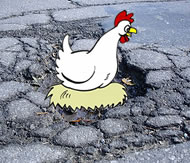Noce /nɔs/ is a French word I learnt last night meaning “wedding” (ceremony) or wedding party. Here are some examples of usage:
– être de la noce – to be (a member) of the wedding party, to be among the wedding guests
– être de noce – to be invited to a wedding
– aller à la noce de quelqun – to go to somebody’s wedding
– repas/robe/nuit de noce – wedding banquet/dress/night
– noce d’argent / d’or etc – silver/golden wedding
– fare la noce – to live it up / have a wild time
– il n’était pas à la noce – he wasn’t enjoying himself / was have an uncomfortable time
– il n’avait jamais été à pareille noce – he’d never been so happy / he was having the time of his life
Noce, sounds like the Welsh word for night nos, so when I first heard it I thought nights and not weddings were being discussed. It comes from the Latin word nuptiae (wedding/marriage), which is derived from nubere (to veil/hide) – this goes back to a Roman custom that married women wore veils. Nuptiae is also the root of the English word nuptial (to marry; to speak of a wedding; wedding), and of the French word nuage (cloud).
An alternative to noce is mariage, which can refer both to the institution of marriage and the marriage/wedding ceremony. The English word wedding comes from the Old English węddian (to wed), while marriage comes from the French mariage.
